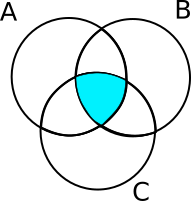Exercises with sets#
Exercise - syllabs#
Write a function syllabs which given a string word made by only bisyllabs and a set found, finds all the distinct bisyllabs and puts them into the set found.
NOTE: the function
syllabsreturn NOTHING !
Show code cell content
def syllabs(word, t):
for i in range(0, len(word), 2):
t.add(word[i : i + 2])
found = set()
syllabs("banana", found)
print(found)
found = set()
syllabs("parariraparara", found)
print(found)
{'na', 'ba'}
{'ra', 'ri', 'pa'}
Exercise - distinguish#
✪✪ Write a function distinguish which given a list big_list containing sublists of two characters each, RETURN a NEW LIST containing all the distinct sublists (ignoring the duplicated sublists)
the returned list must have the elements in the same order in which they were found in
big_listvariable
big_listmust not be modifiedto know fast whether a sublist was already found, use a set
DO NOT search in lists (so no
count,index,inin lists - they’re slow!)DO NOT remove from lists (so no
removefrom lists - it’s slow!)HINT: lists are mutable, can we place them in a set? If it’s not possible, what can we do?
Show code cell content
def distinguish(blist):
s = set()
ret = []
for sublist in blist:
# In sets we can't place lists because they are mutable,
# but we can insert tuples
tup = tuple(sublist)
# Checking whether an element belongs to a set it's very fast:
# it is independent from the set dimension!
if tup not in s:
ret.append(sublist)
# Adding an element to a set is very fast:
# it is independent from the set dimension!
s.add(tup)
return ret
big_list = [
["d", "d"],
["a", "b"],
["d", "d"],
["c", "a"],
["c", "a"],
["d", "d"],
["a", "b"],
]
print("distincts:", distinguish(big_list))
print("big_list:", big_list)
distincts: [['d', 'd'], ['a', 'b'], ['c', 'a']]
big_list: [['d', 'd'], ['a', 'b'], ['d', 'd'], ['c', 'a'], ['c', 'a'], ['d', 'd'], ['a', 'b']]
Exercise - intersectron#

Given a list sets containing an arbitrary number of sets, RETURN a NEW set which contains the elements common to all sets.
To solve the exercise, you can intersecate a set at a time with a for cycle (slow) or with the technique described here (short and fast).
try to solve it in both ways
BEWARE of the empty list!
your code must work with any number of sets (the image is just an example)
Show code cell content
def inter_for(sets):
if len(sets) == 0:
return set()
first = True
for el in sets:
if first:
ret = set(el)
first = False
else:
ret.intersection_update(el)
return ret
assert inter_for([]) == set()
assert inter_for([set(), set()]) == set()
assert inter_for([set(), set(), set()]) == set()
assert inter_for([{"a"}, {"a"}, {"a"}]) == {"a"}
assert inter_for([{"a", "b"}, {"b"}, {"b"}]) == {"b"}
assert inter_for([{"a"}, {"a", "b"}, {"a"}]) == {"a"}
assert inter_for([{"c"}, {"c"}, {"c", "b"}]) == {"c"}
assert inter_for([{"a", "b"}, {"a", "b"}, {"a", "b"}]) == {"a", "b"}
assert inter_for(
[{"a", "b", "c"}, {"a", "b", "c", "d"}, {"b", "c", "d"}, {"b", "c"}]
) == {"b", "c"}
# check we didn't modify the input sets
s = {"a", "b"}
assert inter_for([s, {"b", "c"}]) == {"b"}
assert s == {"a", "b"}
Show code cell content
def inter_fast(sets):
if len(sets) == 0:
return set()
return set.intersection(*sets)
assert inter_fast([]) == set()
assert inter_fast([set(),set()]) == set()
assert inter_fast([set(),set(),set()]) == set()
assert inter_fast([{'a'},{'a'},{'a'}]) == {'a'}
assert inter_fast([{'a','b'},{'b'},{'b'}]) == {'b'}
assert inter_fast([{'a'},{'a','b'},{'a'}]) == {'a'}
assert inter_fast([{'c'},{'c'},{'c','b'}]) == {'c'}
assert inter_fast([{'a','b'},{'a','b'},{'a','b'}]) == {'a','b'}
assert inter_fast([{'a','b','c'},{'a','b','c','d'},{'b','c','d'}, {'b','c'}]) == {'b','c'}
# check we didn't modify the input sets
s = {'a','b'}
assert inter_fast([s,{'b','c'}]) == {'b'}
assert s == {'a','b'}